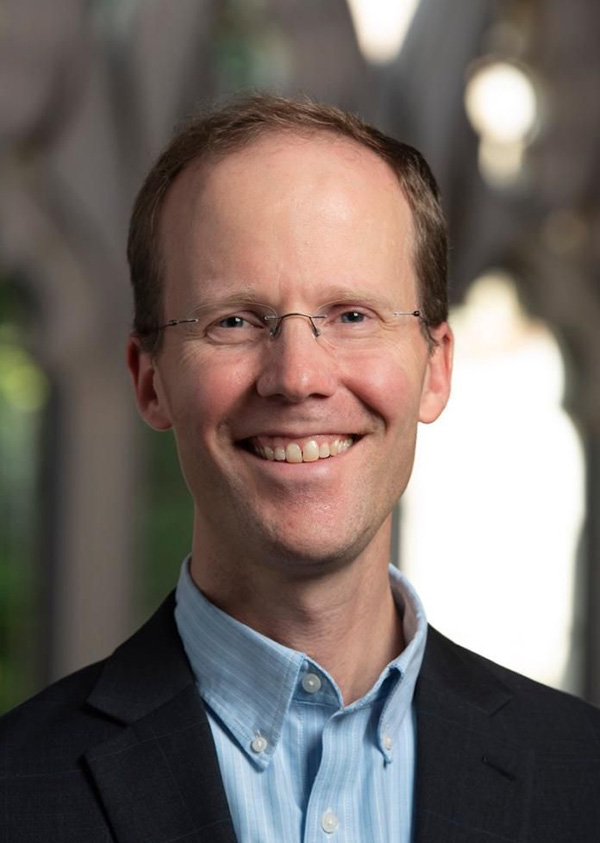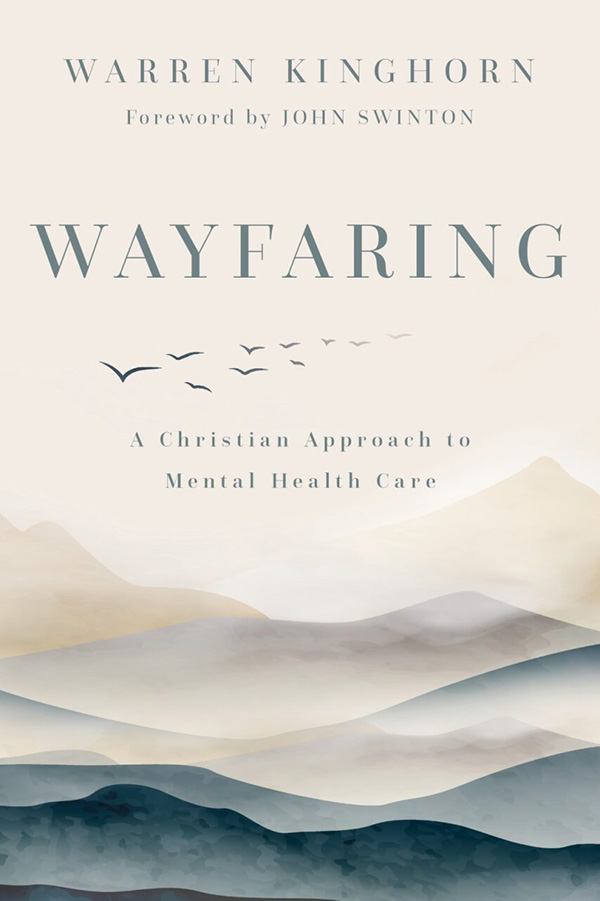Warren Kinghorn has long connected the worlds of theology and medicine. In the midst of medical school, he took two years to complete a master of theological studies degree before returning to finish his medical program.
“The question of how does Christian faith inform the practice of medicine has always been at the center of my thought and now at the center of my work in teaching,” Kinghorn said.
This focus on the interrelationship of medicine and Christian theology has led to his recent book, “Wayfaring: A Christian Approach to Mental Health Care,” in which Kinghorn expresses his love for and frustrations with the work of psychiatry and mental health.
Key in the book is Kinghorn’s approach to mental health care, not as fixing a series of symptoms, but as restoring a human’s way of living and relating to self, others and God holistically.
Kinghorn spoke to Faith & Leadership’s Chris Karnadi about the book, how practicing psychiatry and teaching theology intertwine, and practical advice for congregations seeking to address mental health more faithfully. The following is an edited transcript.
Faith & Leadership: You mention in the book that you have both love for and deep dissatisfaction with the work of psychiatry. What are some of those loves and frustrations?

Warren Kinghorn: When I was first contemplating going into the field of psychiatry, I met with a psychiatrist who was also a Jesuit priest and had been a chair of psychiatry at a teaching hospital in Boston. I’ve always remembered him saying that it is a great privilege as a psychiatrist, or anyone in mental health, to be able to sit with people and to attend to people as whole persons.
In my professional role, I don’t attend to any particular organ system or manage the IV drips or the ventilator but I attend to this patient as a whole person — and that is a great privilege.
But what I’ve noticed in my training in psychiatry and in my work as a psychiatrist is that it doesn’t always work that way. We can too easily treat people not as whole persons but rather as collections of symptoms, and then we try to find ways to reduce symptoms in ways that make people feel like they’re being treated as machines or as widgets in an assembly line.
F&L: Can you speak more about the machine metaphor of mental health?
WK: In the book, I critique what I call the machine metaphor of mental health care, where people have symptoms to solve. People come to me as a psychiatrist, or they come to other counselors or therapists, with unwanted experiences or behavior. People feel ways that they don’t want to feel.

They’re doing things they don’t want to do, and they want things to change somehow. As a psychiatrist, it’s really easy for me to say, “Oh, I recognize that as symptoms,” rather than seeing the whole person.
I’m renaming people’s experiences as symptoms of a particular disorder or diagnosis. I assign a diagnosis that is a cluster of symptoms, and so I might diagnose someone with major depressive disorder or generalized anxiety disorder or obsessive-compulsive disorder.
Then I can reach into my toolbox of evidence-based treatments, whether that’s medication or a referral for psychotherapy or other things, and say, “Well, here. This is a treatment for this disorder.” If the treatment results in the symptoms reducing, then the patient and I would say, “Well, the treatments worked, because the symptoms have been reduced.”
That leads to the whole mental health economy, because anything that you can apply, you can buy and sell, whether that’s a medication or whether that’s a unit of time.
The world of mental health care can easily go on as this process of naming experiences as symptoms, clustering symptoms as diagnoses, applying technologies or techniques to reduce those symptoms. That’s how things can feel. There’s a lot of good to that. A lot of things about that way of thinking are helpful. It can lead, for example, to carefully controlled clinical trials and the development of exciting new treatments within mental health care. But there are a few problems with it as well.
One thing that can happen is that people can think of mental health problems as something that’s broken inside a person that needs to be fixed.
It’s easy to think of mental illness as somehow inside us, unique to ourselves, rather than thinking of mental health problems as sometimes our challenges in responding to difficult relationships or communities or social contexts that are outside of us.
I think another thing that can happen is people can often focus on the body and the brain as the site of what’s wrong, which can lead to the assumption that biological treatments like medications are a solution, but it may be that they are struggling, not primarily because something’s wrong in the brain, but because something’s wrong in the world around them.
They’re struggling to adapt to that or to adjust to grief and loss and trauma, and yet thinking only about the brain individualizes things in a way that’s not helpful.
I think this approach can often lead people to think that mental health care is a matter of reducing symptoms rather than learning to live wisely and fully in the world, which I think should be the goal of human life, as well as of any health care or mental health care.
I think also this machine approach sometimes doesn’t address the important questions that people really care about, like, Who am I? Do I matter? Am I loved? What’s the path of my life?
I think that in all of those ways, simply thinking about mental health care as a practice of reducing symptoms is never enough. It might be, for a time, a way to get by. I certainly want my patients to have less distress than they do; I want their symptoms to be reduced. But it’s not enough, and we have to have a broader view. This book is an effort to try to get a sense of what is that broader view.
F&L: Why was Thomas Aquinas a good dialogue partner throughout the book?
WK: It’s a very good question to ask why a book about Christian approaches to modern mental health care would draw most centrally on a philosopher and theologian who lived and wrote in the 13th century.
Why Thomas Aquinas? I think I’d answer that in a few ways. I think one is that Aquinas is a central figure in Christian tradition in Western Christianity and of the pre-Reformation, undivided Western church.
Aquinas is an important theologian and thinker for any modern Christian in either the Protestant or Catholic traditions.
As a Dominican, Thomas studied philosophy and theology at a time when the study of Aristotle was being reintroduced to the Latin Western Christian world. That mattered because Aristotle, especially in comparison with many other thinkers at the time, was very focused on a close observation of material things, observation of animals and plants, and close observation of the human being.
Aquinas gained this appreciation of, What does it mean to be a close observer of human nature and of the emotions and of action and of the world of creatures all around? That gave rise, for him, to this beautiful vision of human life as a kind of pilgrimage.
This vision of human beings as wayfarers, as pilgrims who are good creatures of God, who are travelers in this life with our goal as union with God, is, I think, a captivating vision that matters for the way that we engage our lives now, the way that we engage health care more broadly, and the ways that we engage mental health care specifically.
F&L: How can faith leaders become better at providing safe spaces for people to ask questions about mental health and seek better care?
WK: Churches — and more broadly, congregations and Christian communities — are central, vital communities of support and discernment and encouragement for people who are living with mental health challenges.
There is plenty of research that suggests that many people will go to a pastor for support for emotional and psychological suffering before they’ll present to any clinician, including a primary care clinician.
Churches are more proximate, and they’re more deeply located in communities than any health care institution. The church is called to be an interdependent body, where people know each other and care about each other. Churches can be a place of support. Of course, that’s not the case if people who live with mental health challenges feel that they’re alone or that they don’t belong or that they’re not accepted or not welcomed.
One thing I’d recommend to any pastor or any leader of a Christian community is to recognize that mental health challenges are extremely common in our culture.
Simply recognizing the prevalence of particular diagnoses can be helpful. At any given time, somewhere around 5% to 8% of American adults will currently meet the criteria for a major depressive episode. Over the course of our lives, about 1 in 5 of us will experience major depression.
That’s just one experience of a mental health challenge. There are plenty of others that, added together — from a third to a half of us, over the course of our lives, we’ll meet diagnostic criteria for some form of mental health challenge. That’s a lot of people in a congregation.
When someone’s standing in front of a group of 100 or 200 people on a Sunday morning, there are a lot of people in the congregation that are either currently struggling with mental health problems or they love someone who’s currently struggling with mental health problems who may not be there. Those experiences are going to be there whether they’re named or not.
F&L: Do you have any practical recommendations for congregations?
WK: One is simply to be willing to speak about mental health in church. I think affirmations and naming the reality of mental health problems formally in worship settings and from the pulpit is important and empowering for churches. That includes prayers of the people; remembering and praying for people who are struggling with psychological challenges, not by name but as a group, is really helpful.
Second is providing communities where people can engage more deeply to think about the relationship between Christian faith and mental illness. There are some great resources for that. In my own congregation this spring, we offered a course that’s published by Sanctuary Mental Health Ministries out of Vancouver, British Columbia. This is a free video curriculum that any congregation can use.
For my congregation, it was a really helpful way to invite people to just think deeply about the good news of Christian faith as it relates to mental health.
Third, churches can think very intentionally about their structures of pastoral care. Not putting everything on the pastor or on the church staff to be able to think about, but to put structures in place where there are ways that people can access support and can be supported when they’re going through significant mental health problems. Stephen Ministries may be one pathway to do that, but there may be other structures that work well for different congregations and communities.
Clergy can also develop active relationships with mental health clinicians in their community. They can learn who in the community is not only well respected in terms of offering good mental health care but is also respectful of people who come from particular faith commitments and works well with people as they wrestle with mental health problems in the context of faith.
Those kinds of relationships between clergy and clinicians can go a long way in terms of trust and in terms of being able to know how to refer people for the right kinds of mental health care.
Finally, I would say there are times when clinicians really are needed. I think for churches to speak about the reality, for example, of suicide is very important.
Suicide is a very present reality in our culture, and [it’s important for churches] to both clearly affirm that when people are struggling with thoughts of suicide there’s help for them, and then to help them get the help that they need.
In almost every case, that will warrant a person seeing a mental health clinician both to understand what they’re going through and to help them stay safe and find a place of health and safety beyond the situation that they’re going through at present.
















